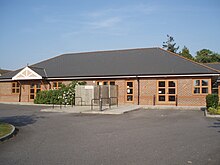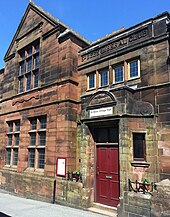Village hall

A village hall is a public building in a rural or suburban community which functions as a community centre without a religious affiliation.
United Kingdom


In the United Kingdom, a village hall is a building which is owned by a local government council or independent trustees, and is run for the benefit of the local community. It is estimated that there are over 10,000 such village halls.[1] Most were built in the first decade after World War I (1919-1929) as part of a programme led by the newly-formed National Council of Social Service.[2]
Such a hall is typically used for a variety of public and private functions, such as:
- Parish council meetings
- Polling station for local and national elections
- Sports and exercise groups - badminton is typical
- Local drama productions
- Dances
- Jumble sales
- Private parties such as birthdays or wedding receptions
Village halls are generally run by committees, and if not already part of a local government body such as a parish council, then such committees are eligible for charitable status.[3] They may have other names such as a Village Institute or Memorial Hall. In some localities a church hall or community centre provides similar functions.
Typically the hall will contain at least one large room, which may have a stage at one end for drama productions. There is often a kitchen for preparing food and toilets to one side. Larger halls may incorporate further smaller rooms to allow multiple simultaneous activities.[4]
Wales
The word neuadd (IPA: /'neiæð/) is used to refer to village halls in Welsh-speaking parts of Wales, as in Neuadd Dyfi, the village hall in Aberdyfi.[5]
United States

In the United States, a village hall is the seat of government for villages. It functions much as a town hall or city hall.
See also
- Church hall
- Community centre
- Function hall
- Local community
- Meeting house
- Moot hall
- Village Hall (TV series)
External links
Action for village halls in England
References
- ^ [1] ACT website Jan 2019
- ^ "Village Halls History". 100 Rural Years. Action with Communities in Rural England. Retrieved 20 September 2023.
- ^ Use of Church Halls for Village Hall and Other Charitable Purposes Archived 2012-10-03 at the Wayback Machine, Charity Commission, United Kingdom, July 2001.
- ^ Sport England Design Guidance Note - https://sportengland-production-files.s3.eu-west-2.amazonaws.com/s3fs-public/village-and-community-halls.pdf?VersionId=NwtRYNuZMMWC5n9LvP_lB4RZ5DNeVUL7
- ^ "Neuadd Dyfi". Retrieved 2 November 2009.
